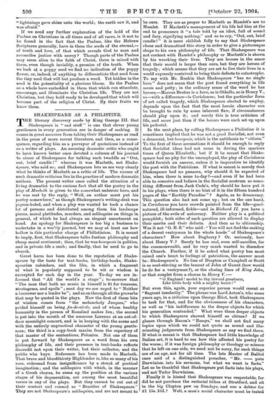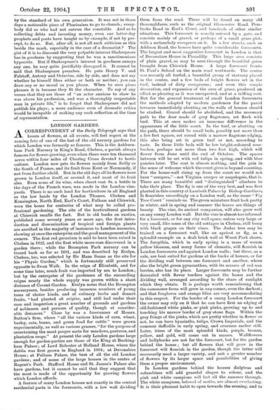T HE literary discovery made by King George III. that Shakespeare
is " sad stuff " is one that clever young gentlemen in every generation are in danger of making. It comes in great measure from taking their Shakespeare as read in the press of more recent literature, and then, as a conse- quence, regarding him as a purveyor of quotations instead of as a writer of plays. An amusing dramatic critic who ought to have known better once devoted a column of his journal to abuse of Shakespeare for talking such twaddle as " Out, out, brief candle !" whereas it was Macbeth, not Shake- speare, who said so ; and Shakespeare lets us see very clearly what he thinks of Macbeth as a critic of life. The excuse of such dramatic criticism lies in the practice of modern dramatic authors. The present writer once called the attention of a living dramatist to the curious fact that all the poetry in the play of Macbeth is given to the somewhat unheroic hero, and he was met by the reply, " Well, an author must put his poetry somewhere," as though Shakespeare's writing-desk was pigeon-holed, and when a play was wanted he took a chance lot of persons and distributed among them his landscape pieces, moral platitudes, murders, and soliloquies on things in general, of which he had always an elegant assortment on hand. An apology for Shakespeare is too big a business to undertake in a wee'lly journal, but we may at least see bow hollow is this particular charge of Philistinism. It is meant to imply, first, that Shakespeare talks fustian philosophy and cheap moral sentiment; then, that he was bourgeois in politics, and in private life a snob; and finally, that he used to go to church.
Great harm has been done to the reputation of Shake- speare by the taste for text-books, birthday-books, Shake- spearian calendars, and the like, in which a fragment of what is popularly supposed to be wit or wisdom is excerpted for each day in the year. To-day we are in- formed that " All the world's a stage " ; to-morrow that "The man that hath no music in himself is fit for treasons, stratagems, and spoils " ; next day we are urged to " Neither a borrower nor a lender be " ; and so on through all the proverbs that may be quoted in the plays. Now the first of these bits of wisdom comes from " the melancholy Jacques," who prided himself on being fin-de-si'ecle, and of whom healthy humanity in the person of Rosalind makes fun; the second is put into the mouth of the amorous Lorenzo at an out-of- door moonlight concert, and is in keeping with the scene and with the entirely impractical character of the young gentle- man ; the third is a copy-book maxim from the repertory of that master of the sententious, Polonius. Not one of them is put forward by Shakespeare as a word from his own philosophy of life, and their presence in text-books reflects discredit not upon their writer, but their collector, and the public who buys. Reference has been made to Macbeth. That brave and bloodthirsty Highlander is, like so many of his race, redeemed from insignificance by a streak of poetical imagination ; and the soliloquies with which, in the manner of a Greek chorus, he sums up the position at the various stages of his degeneration, are among the most beautiful verses in any of the plays. But they cannot be cut out of their context and conned as " Beauties of Shakespeare." They are not Shakespeare's soliloquies, and are not meant to. be ours. They are as proper to Macbeth as Hamlet's are to Hamlet. If Macbeth's management of his life led bim at the end to pronounce it " a tale told by an idiot, full of sound and fury, signifying nothing," and so to cry, "Out, out, brief candle ! " it is mere childish folly to say that Shakespeare chose and dramatised this story in order to give a picturesque shape to his own philosophy of life. That Shakespeare was not content with Hamlet's philosophy or Macbeth's is shown by his wrecking their lives. They are heroes in the sense that their mould is larger than ours, but they are heroes of tragedy ; which means that they are set to live their lives in a world expressly contrived to bring their defects to catastrophe. To say with Mr. Ruskin that Shakespeare " has no single hero" does not mean that the poet found everything in life mean and petty; in the ordinary sense of the word he has heroes,—Marcus Brutus is a hero, so is Othello, so is Henry V., so—with a difference—is Coriolanus; but the particular form of art called tragedy, which Shakespeare elected to employ, depends upon the fact that the most heroic character can be brought to ruin by some inherent flaw, if circumstances should play upon it; and surely this is true criticism of life, and more just than if the heroes were each set up upon his pedestal.
In the next place, by calling Shakespeare a Philistine it is sometimes implied that he was not a good Socialist, not even 'a democrat, but bourgeois, which is the antithesis to "citizen." To the first of these accusations it should be enough to reply that Socialist ideas had not come in during the spacious times of Queen Elizabeth ; 'but if it be meant that Shake- speare had no pity for the unemployed, the play of Coriolanus would furnish an answer, unless it is imperative to identify the poet with the Patricians. If what is meant is merely that Shakespeare had no panacea, why should it be expected of him, when there is none to-day ?—and even if he had been able to conceive and believe in the Socialist nostrum as some- thing different from Jack Cade's, why should he have put it in his plays, when there is no hint of it in the fifteen hundred pages of the "Earthly Paradise" ? Again, as to democracy. This question also had not come up ; but on the one hand, in Coriolanus you have crowds painted from the life—good- natured, ill-informed, fickle—and in Richard II. you have a picture of the evils of autocracy. Neither play is a political pamphlet ; both sides of each question are allowed to display their merits and their defects. And then as to citizenship. Was it not "G. B. S." who said : " You will not find the making of a decent vestryman in the whole horde " of Shakespeare's characters ? How about Dogberry ? Or, seriously, how about Henry V. ? Surely he has zeal, even self-sacrifice, for the commonwealth, and he very much wanted to disendow the Church. Further, if it be asked what poetry has most raised one's heart to feelings'of patriotism, the answer must be : Shakespeare's. No line of Drayton or Campbell or Scott is so soul-stirring as the lament of John of Gaunt (how would he do for a vestryman P), or the closing lines of King John, or that couplet from a chorus in Henry V.:- " 0 England ! model to thy inward greatuess,
Like little body with a mighty heart !"
But even this, again, your superior person would resent as "flagrant insularity." The phrase was Lord Acton's, who some years ago, in a criticism upon George Eliot, took Shakespeare to task for that, and for the obviousness of his characters, as well as "his indifference to the deeper objects for which his generation contended." What were these deeper objects to which Shakespeare showed himself so obtuse? If we glance through Bacon's " Essays," we shall not find many topics upon which we could not quote as sound and illu- minating judgments from Shakespeare as any we find there. If what is meant is that Shakespeare had little knowledge of Italian art, it is hard to see how this affected his poetry for the worse ; if it was foreign philosophy or theology or science that he left on one side, we need not be sorry, for such things are of an age, not for all time. The late Master of Balliol once said of a distinguished preacher, " Mr. — puts Darwinism into his sermons, but what we want is facts." Let us be thankful that Shakespeare put facts into his plays, and not Tudor Darwinism.
Finally it is hinted that Shakespeare was respectable, for did he not purchase the rectorial tithes at Stratford, and sit in the big Clopton pew on Sundays, and sue a debtor for £1 15s. 10d. ? Well, a man's social character must be tested.
by the standard of his own generation. It was not in those days a noticeable piece of Pharisaism to go to church ; every- body did so who had not outrun the constable. And as to collecting debts and investing money, even our latter-day prophets and poets have taught us by example, if not by pre- cept, to do so. But, after all, is not all such criticism as this beside the mark, especially in the case of a dramatist ? The gist of it is to discount the very palpable interest Shakespeare has in goodness by suggesting that he was a sanctimonious hypocrite. But if Shakespeare's interest in goodness annoys any one, he may quite justifiably disregard it. It cannot be said that Shakespeare preaches. He puts Henry V. and Falstaff, Antony and Octavius, side by side, and does not say whether he himself likes either or both or neither; you can draw any or no moral as you please. When he uses pious phrases it is because they fit the character. To say of any verses that they are those of " an actor anxious to show he was above his profession, and was a thoroughly respectable man in private life," is to forget that Shakespeare did not publish his plays ; a mere audience even of dramatic critics would be incapable of making any such reflection at the time of representation.
LONDON GARDENS.











































 Previous page
Previous page